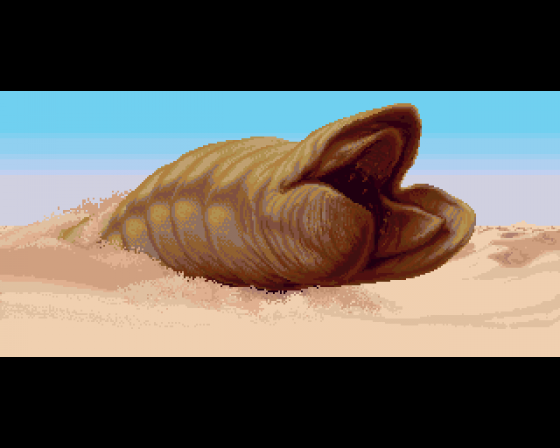
Amiga Power
 1st July 1992
1st July 1992
Categories: Review: Software
Author: Dave Golder
Publisher: Virgin Games
Machine: Amiga 500
Published in Amiga Power #15
It's the rare film licence that comes out at exactly the same time as the movie, but few are this late. Still, it looks like the game's well worth the wait...
Dune
One thing's for sure. You can't really accuse Virgin of trying to cash in on the success of the film here, and for two very good reasons. For one thing, the movie wasn't exactly successful (critically or financially), and for another thing it came out about eight years ago. (Even by film conversion standards, which hardly ever make it out in time to tie-in with the movie, that's pretty late...)
No, you're best off thinking of this more as a game of the phenomenally successful book, then - one which just happens to make use of much of the look of the film. Think of it also as being different to most film tie-ins in that it's actually rather good.
Let's concentrate on the visual side first though, as it's rather interesting. As you can probably see from the screenshots, the faces in the game look just like the characters from the film - somehow programmers cryo have persuaded Kyle McLachlan (more famous now for Twin Peaks) and Francesca Annis (more famous now for, um... well, Mark thinks she's pretty good!) to let them use their fizogs. And a damned fine job the artists have done too.
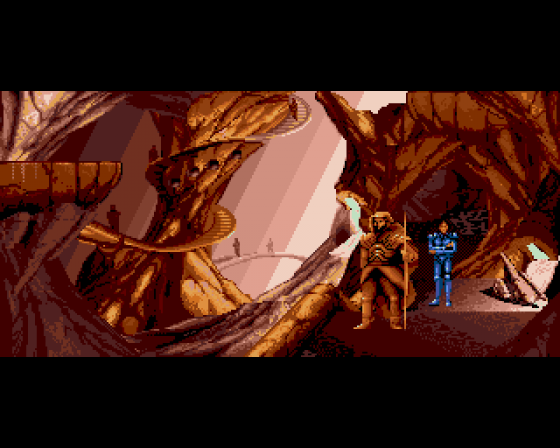
A lot of the 'look' of the hardware in the game also borrows heavily from designs seen in the film, though they're not direct copies. Still, it gives the game a very professional, designy look - and when you think of how little a game like Total Recall really looked like the film, this has to be seen as a real achievement. Other details of the visual side of things will become clearer as we go through the game - for now, let's just say it's very good looking indeed.
The game is, of course, basically a graphic adventure, but one with liberal dollops of strategy thrown in. I'd normally at this point say the plot will be familiar to anyone who's seen the film - except that anyone who's familiar with the film (or, indeed, read the book) will tell you there's nothing the slightest bit basic about it.
Certainly, eight years ago most audiences were leaving the cinema totally bewildered, and things haven't become any clearer on repeated TV viewings - so much so that the programmers here have actually done their best to simplify things so as not to lose their audience right away. Having said that, while this new version of the plot at least has a linear development [This is beginning to sound like The Late Show... - Ed] it still doesn't make a massive amount of sense. Still, what the heck, eh? It's still better than the usual cliche-ridden Lord Of The Rings rehash.
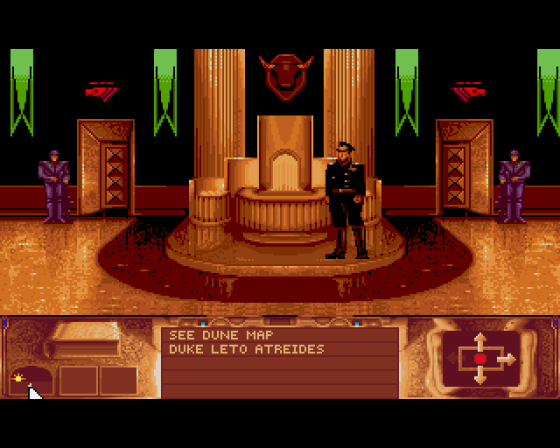
Here, then, is the basic story - or the best I can do anyway. The Emperor has sent the Artreides family (of which you, Paul, are a member) to the desert planet Arakis, also known as Dune, to mine Spice - the most valuable thing in the galaxy, as it prolongs life.
Unfortunately, the Harkonnens, your family's long-time enemies, are already on Arakis and mining away merrily. This causes problems for you obviously, as does the fact that Dune's local inhabitants, the Fremen, are on the lookout for an ousider who they'll worship as their new god and who'll make the planet lush with vegetation - and they reckon it's you!
Your mum, a psychic nun, seems to confirm this too - she's trained you in the secret ways of her Bene Gesserit sect, and believes that your bering near to so much Spice will akaen great powers within you. And thus the scene is set. There's a lot to take on board, but as the game develops, more and more of it starts to make some sort of sense - and anyway, so long as you know what your immediate game task is, understanding the overall picture can probably wait.
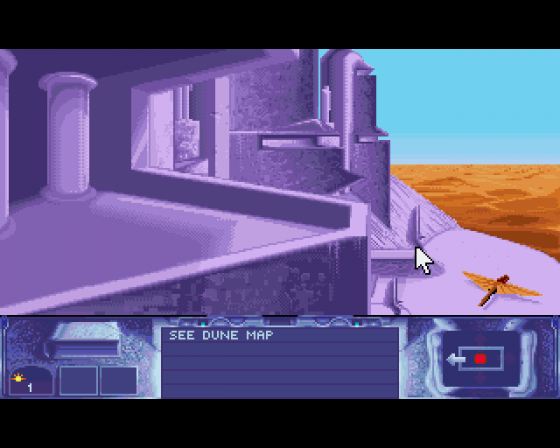
That's the set up then - the story itself is divided into three main sections. When you first arrive on Arakis you have to make contact with the Fremen and get them mining for you. (This is necessary to keep the Emperor off your back - he keeps sending messages demanding Spice.) Next up you have to train the Fremen into armies to attack the Harkonnens. Finally you have to make contact with a fabled ecologist called Kynes, who will reveal the secret of turning Dune into a tropical paradise.
Throughout the game, your character, Paul, gains in power. For instance, he starts having visions and begins to be able to communicate with the Fremen telepathically; both are pretty handy, not just for the purposes of the plot, but also in terms of making the game much less hassle than many other adventures. Telepathy allows you to issue orders without having to zoom around the planet to make personal contact, for instance, while the visions neatly save you from missing out on any vital plot developments (although the umpteenth reminder from the palace to send the Emperor his Space can get a mite tedious).
Partly because of the introduction of these handy dandy superpowers, the game's control system is wonderfully intuitive. You hardly have to refer to the manual at all, which is the way things should be. Just a few licks on the icon bar at the bottom of the screen are all you need to issue orders, move around the planet, talk to people and so on. There is no typing: when you want to indulge in meaningful conversation you just highlight the character you want to talk to, then a selection of likely things you might want to say pops up. You simply choose the one you want. (This is both good and bad, of course, while you're unlikely to miss out on important facts because you don't know the correct question to ask, equally it's almost impossible not to ask the right questions, and thus plough right through the game.)

Don't worry though - Dune never becomes simply an interactive storybook, rather than a game, as tends to happen to graphic adventures. The main reason is that the strategy elements inject an extra, and much less black and white, dimension to the thing. For one thing, you have to deplot your Fremen sensibly - you need to make sure that you always have enough of them producing Spice to send the Emperor (otherwise you'll get a rather nasty visit from his Saudaukar storm troops) while at the same time be training plenty of them to attack the Harkonnens.
There's equipment to find, various ways to speed up Spice production to uncover, ways to improve Fremen military training to suss out, giant sandworms (who tend to chew up vital equipment) to avoid and so on - there's a lot to try and sort out as best you can.
Inevitably, however, there are faults with the game. Battles, for instance, are simply a case of indicating which troops you want to attack which area, then sitting back and waiting for a vision to tell you how things have gone - they could be more exciting.
Sand In The Place Where You Are
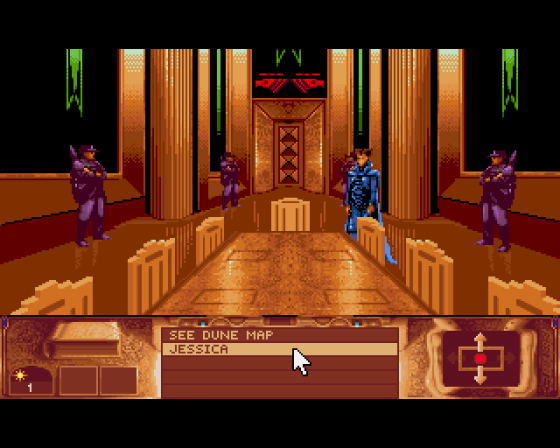
The maps could be a bit more helpful too. It would be nice to have one which tells you how things are going at each 'seitch' (the Fremen's name for their settlements) at a click too (though having said that, a comparable ability does become available when Paul gains his psychic powers).
The main problem, however, is that the game's all bit leisurely; and you rarely feel under any kind of pressure. The plot developments are virtually handed to you on a plate, and a lot of the characters act as mere cyphers to push things along it would be much better if there were a few more options available to you. (Also, some of the humour is pretty cringe-inducing - being told that Jessica really does have some amazing facilities," is fairly typical - but that's really a very minor point.)
When all's said and done though, I enjoyed Dune a lot. As I've said, the graphics are superb, with excellently drawn characters, detailed backgrounds and clearly laid-out control bars. The animation sequences are also top notch - some of the ornithopter flying sequences could almost be dsecribed as beautiful - and the plot is fascinating. A very polished game then, and one which should appeal to fans of the book, graphic adventure lovers and general gamers alike.
The Bottom Line

Uppers: It looks great, the control system is straightforward, the plot is original (for an adventure game, that is - I know it's been swiped from a book, smart alec) and engrossing and it features a digitised Francesca Annis. [Are you sure that's really an important plus point? - Ed]
Downers: Issuing some of the commands could be easier, while all the seitches ('towns', remember?) you visit look the same - which, besides being confusing, is also downright dull. Worst of all, though, there's never any real feeling of being threatened; it's all a bit too comfy for, well, comfort.
Not so much a simple adventure as a strategy game-cum-animated book, this should appeal to adventure fans and gamers not usually into the genre - and, indeed, non-game-playing gans of the book - alike, I enjoyed it - this is one of the few games where you actually find yourself caring about some of the characters!



